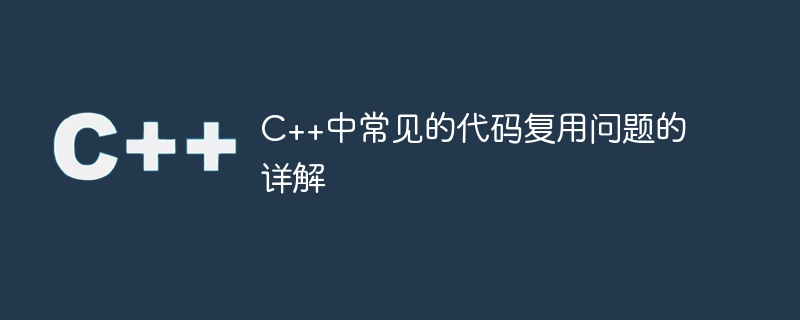

Detailed explanation of common code reuse issues in C
In C programming, code reuse is an important technology that can improve the maintainability of the code. and reusability. However, in practice, we often encounter some code reuse problems. This article explores some common issues and provides specific code examples.
1. Problems caused by inheritance
Inheritance is a way to achieve code reuse in C, but it also brings some problems. For example, when a class A inherits another class B, class A will inherit all member functions and member variables of class B. This may result in class A having unnecessary members, thereby increasing code complexity and memory overhead.
Consider the following example:
class Animal {
public:
void eat() {
std::cout << "Animal eats" << std::endl;
}
};
class Dog : public Animal {
public:
void bark() {
std::cout << "Dog barks" << std::endl;
}
};
class Poodle : public Dog {
public:
void play() {
std::cout << "Poodle plays" << std::endl;
}
};In this example, the class Poodle inherits the member functions of Animal and Dog. However, if we just need a dog that can play, there is no need to inherit the member functions of the Animal class. One way to solve this problem is to use composition instead of inheritance:
class Animal {
public:
void eat() {
std::cout << "Animal eats" << std::endl;
}
};
class Dog {
private:
Animal animal;
public:
void bark() {
std::cout << "Dog barks" << std::endl;
}
void play() {
std::cout << "Dog plays" << std::endl;
}
};By using composition, we can avoid unnecessary inheritance and the code will be more concise and readable.
2. The Problem of Multiple Inheritance
Multiple inheritance is another way of code reuse in C, which allows one class to inherit from multiple base classes. However, multiple inheritance may also cause some problems, especially if there are member functions or member variables with the same name in the base class.
Consider the following example:
class Base1 {
public:
void print() {
std::cout << "Base1" << std::endl;
}
};
class Base2 {
public:
void print() {
std::cout << "Base2" << std::endl;
}
};
class Derived : public Base1, public Base2 {
public:
void printDerived() {
std::cout << "Derived" << std::endl;
}
};In this example, class Derived inherits the print() member function from two base classes, Base1 and Base2. If we call Derived's print() function, an ambiguity error will occur.
One way to solve this problem is to use qualifiers to indicate which base class member function to use:
class Derived : public Base1, public Base2 {
public:
void printDerived() {
std::cout << "Derived" << std::endl;
}
void printBase1() {
Base1::print();
}
void printBase2() {
Base2::print();
}
};By using qualifiers, we can clearly specify which base class member function to call. .
3. Template issues
Template is another common way of code reuse in C. It allows the creation of generic classes and functions that can automatically generate code based on different data types. However, templates can also create some problems.
Consider the following example:
template<typename T>
T max(T a, T b) {
return (a > b) ? a : b;
}In this example, we define a template function max() that compares two values and returns the larger value. However, when we pass parameters of different types, it may cause compilation errors.
To solve this problem, we can use template specialization to provide specific implementations for specific types:
template<>
const char* max<const char*>(const char* a, const char* b) {
return (strcmp(a, b) > 0) ? a : b;
}Through template specialization, we can provide specific implementations for const char* types . This way, we can use the max() function normally when comparing strings.
Summary:
This article discusses common code reuse issues in C in detail and provides specific code examples. In practice, we should choose appropriate code reuse technology, avoid unnecessary inheritance and multiple inheritance, and use templates rationally to improve the maintainability and reusability of code.
The above is the detailed content of Detailed explanation of common code reuse issues in C++. For more information, please follow other related articles on the PHP Chinese website!
 What are the differences between c++ and c language
What are the differences between c++ and c language
 Recommended learning order for c++ and python
Recommended learning order for c++ and python
 Cost-effectiveness analysis of learning python and c++
Cost-effectiveness analysis of learning python and c++
 Is c language the same as c++?
Is c language the same as c++?
 Which is better to learn first, c language or c++?
Which is better to learn first, c language or c++?
 The difference and connection between c language and c++
The difference and connection between c language and c++
 C++ software Chinese change tutorial
C++ software Chinese change tutorial
 Cost-effectiveness analysis of learning python, java and c++
Cost-effectiveness analysis of learning python, java and c++




